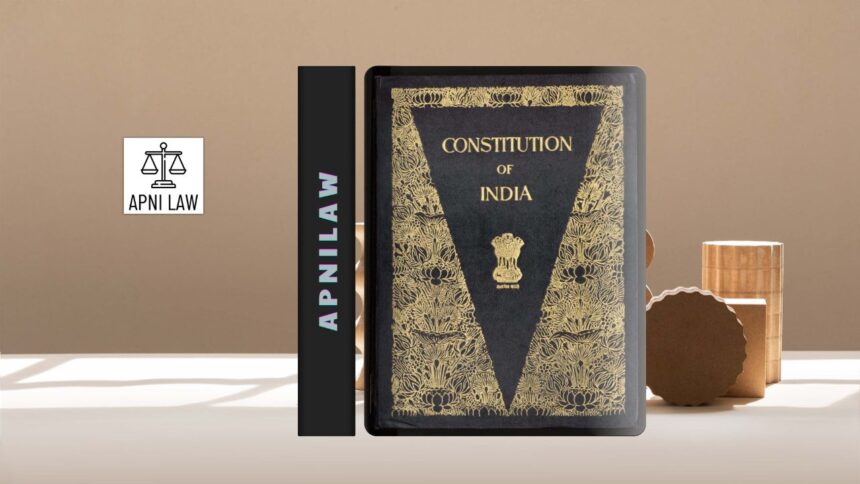The State Council of Ministers forms the real executive authority in every Indian state. Although the Governor is the constitutional head, the Council of Ministers exercises actual power and manages the daily functioning of the state government. The Council works under the leadership of the Chief Minister and ensures that policies are implemented, laws are executed and governance remains efficient. Understanding its role is important for studying federalism and for analysing how the Indian political system functions at the state level.
Constitutional Position of the State Council of Ministers
The Constitution provides the legal foundation for the Council of Ministers through Articles 163 and 164. It establishes that the Governor must act on the advice of the Council of Ministers, except in areas where he exercises discretionary powers. This arrangement mirrors the parliamentary form of government, where the executive remains responsible to the legislative assembly.
The Council of Ministers cannot exist without the Chief Minister. It remains collectively responsible to the Legislative Assembly, which means the entire Council must resign if the Assembly withdraws its confidence. This principle ensures accountability and keeps the executive answerable to the people through their elected representatives.
Composition and Structure
The State Council of Ministers follows a three-tier structure. The top level consists of Cabinet Ministers who hold significant portfolios and shape major policy decisions. The next level includes Ministers of State who assist cabinet ministers or handle independent charges of smaller departments. At the third level, Deputy Ministers support the higher ministers in administrative work. Even though this structure varies across states, the basic design remains the same and ensures smooth administration.
The size of the Council is regulated by a constitutional amendment that restricts it to fifteen percent of the total strength of the State Legislative Assembly. This prevents oversized ministries and promotes efficient governance.
Role of the Chief Minister
The Chief Minister stands at the centre of state governance. He leads the Council of Ministers and advises the Governor on the appointment of ministers. The Chief Minister allocates portfolios, coordinates between ministries and shapes the overall direction of state policy. His leadership determines the strength and stability of the government, and the Council functions as a collective body under his authority.
The Chief Minister also serves as the link between the Governor and the Council of Ministers. He updates the Governor on state affairs and ensures that constitutional procedures are followed.
Responsibilities of the State Council of Ministers
The State Council of Ministers performs a wide range of responsibilities that ensure effective governance. It formulates policies for public welfare and manages state administration through various departments. This includes areas such as education, health, agriculture, finance, policing and infrastructure. Ministers supervise the functioning of departments and ensure that government programmes reach the intended beneficiaries.
The Council maintains internal security through effective policing and law-and-order management. It prepares the state budget, decides expenditure and oversees revenue collection. These financial decisions shape development priorities and determine how resources are allocated.
The Council also plays a crucial role in drafting legislation. Ministers introduce bills in the Legislative Assembly and defend them during debates. They help convert policy ideas into laws that guide state governance. Once laws are enacted, the Council ensures their proper execution by directing administrative machinery.
The Council advises the Governor on all executive decisions. In most matters, the Governor acts on their advice, which makes the Council the real centre of power in a state. This arrangement ensures that elected representatives hold responsibility for governance.
Collective and Individual Responsibility
The Council of Ministers operates under the principle of collective responsibility. All ministers stand together in support of government decisions. Even if a policy belongs to a specific ministry, the entire Council shares its responsibility. If the Legislative Assembly expresses no confidence, the whole Council must resign together. This concept strengthens unity within the executive.
At the same time, ministers remain individually responsible for their departments. If a minister fails to perform or loses the confidence of the Assembly, he may be asked to resign. This dual responsibility ensures both accountability and stability.
Relationship with the Legislative Assembly
The Council of Ministers remains accountable to the State Legislative Assembly. It responds to questions, participates in debates and explains government decisions. The Assembly can seek clarifications, demand reports and examine the performance of ministries. This interaction ensures transparency and keeps the executive in check.
The Assembly also controls the finances of the state. The Council cannot spend public money without legislative approval. This financial oversight makes the Council answerable to the elected representatives and strengthens democratic control.
Significance in Indian Federalism
The State Council of Ministers forms an essential pillar of India’s federal structure. It brings governance closer to the people and allows states to address local needs with autonomy. By exercising executive power at the state level, the Council ensures that India’s democracy functions through decentralised authority.
The Council plays a vital role in implementing central programmes in states. It coordinates with the Union government while protecting state interests. Its decisions influence development, public welfare and administrative efficiency. This makes the Council critical to delivering governance that citizens directly experience.
Conclusion
The State Council of Ministers stands at the heart of the executive structure in every state. It frames policies, manages administration, implements laws and remains accountable to the legislative assembly. Under the leadership of the Chief Minister, the Council ensures that government decisions reflect public needs and constitutional values. Its role continues to grow as states take on more responsibility in India’s evolving federal system. Through its work, the Council strengthens democracy, promotes development and maintains a responsive government at the state level.
For any specific query call at +91 – 8569843472








